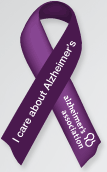Late stage communication
In the late stage of Alzheimer’s disease, most people talk very little or not at all, although they will sometimes surprise us. One occupational therapist described working with a woman who hadn’t been able to carry on a conversation in months. The room where they were working was busy with a variety of activities. At one end, a young male care assistant was trying to flirt with a female care assistant, but she showed no interest. The woman with Alzheimer’s disease suddenly looked at the occupational therapist and said, Unnh-ah, that boy is sellin,’ but she ain’t buyin’.
And that brings us to the most important point about people in the late stage of Alzheimer’s disease: They tend to understand much more than they can express. Never underestimate what a person with Alzheimer’s disease understands, even when the person is no longer coherent. Make sure everything you say in front of someone with AD is something you hope she does understand.
Another interesting aspect of Alzheimer’s disease is that rhythm and cadence remain even when coherency departs, which brings us to the second most important point: People with Alzheimer’s disease always make sense to themselves. It’s up to us to decipher their messages whether they are expressed through words, tone of voice, body language or behaviors. Many people with Alzheimer’s disease simply stop talking in the late stage of Alzheimer’s disease, and others rattle on and on, but make no sense, if all you listen to is the words. Pick up on the feelings of that person as she expresses them by her tone and body language and an occasional word, and you may still be able to carry on the semblance of a conversation. I remember one woman whose jumbled outpouring gave me the impression that she was worried about a friend or relative who was ill. I tried to offer empathy in my tone of voice and a few comforting phrases: I can see you’re concerned. I hope she will be better soon.
My mother, on the other hand, was a cheerful woman who said almost nothing coherent during the last five years of her life, but on most afternoons about 4:00 p.m. rambled on and on and punctuated these “conversations” with laughter, so it was easy to laugh with her and hope I was on target with my responses: He was a card or That was a good time.
When a person with Alzheimer’s disease no longer talks much, it doesn’t mean you should stop trying to converse. On the contrary, people in the late stage of AD need more than ever to be acknowledged, to be called by name and to be made to feel a part of things. If you are at a loss for conversation, talk about the weather: It’s a fine day today or Gosh, it’s miserable outside today – cold and rainy. If you are a caregiver in a day or residential care setting, it is especially important to greet the people you pass in the hallway; don’t ignore them as if they were just a piece of furniture. For family caregivers, talking about the weather may not occupy much time. Consider reading aloud to them during visits – they are likely to love hearing your voice and it takes the pressure to make conversation off both of you.
Many more ideas for activities can be found in:
- My book Getting to Know the Life Stories of Older Adults (To order, click here)
- My monthly online, downloadable, subscription-based newsletter Wiser Now Alzheimer’s Disease Caregiver Tips (To order, click here)
- My online, downloadable, subscription-based Brain Aerobics Weekly (To order, click here)
- Or by contacting me at Kathy@wisernow.com








1 comment:
Post a Comment